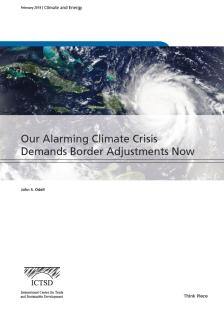
This paper Our Alarming Climate Crisis Demands Border Adjustments Now sketches a preliminary illustration of national climate mitigation policies. It is time for each country that imposes positive net taxes on fossil fuel use at home to extend the same treatment to all goods the country imports, unilaterally if necessary. It should set a default carbon surcharge on an imported product equal to net fossil energy taxes (taxes minus subsidies) applied on a competing home good throughout its supply chain. The government should deduct from this surcharge for a given shipment to the extent that costs due to carbon energy taxes—or other measures that are comparable in effectiveness in reducing greenhouse gas emissions—have already been paid on the imported good in any jurisdiction throughout its own supply chain. All exports from countries where CO2 emissions per capita are low should be exempt from these trade measures. The goal is to help people in high-polluting countries make their national mitigation policies more effective.
An eventual complete plan should satisfy three principles. First, border carbon adjustments should aim for consistency with World Trade Organization rules. Second, the measures should impose the smallest possible additional transaction costs on domestic and international trade. Third, these border adjustments should exempt all exports from the dozens of poor and middle-income countries, whose per capita CO2 emissions are low. The paper concludes by addressing several possible objections. Responding to an obvious one: paradoxically, trade itself in the long term needs carefully limited trade restrictions like these in the short term.
